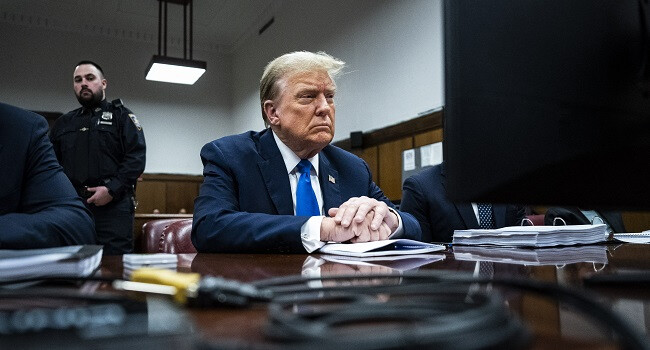
The ruling has the potential to have significant implications for the scope of executive power in the United States as well as for the various legal challenges that Trump faces as he pursues another term in the White House.
Although many constitutional law experts anticipate a legal setback for Trump, he may have already achieved a triumph in the political arena.
The court’s nine justices have taken the case, which has resulted in a delay, possibly indefinitely, of Trump’s trial on charges of conspiring to overturn the results of the 2020 election won by Joe Biden.
The issue of whether a former president can be prosecuted has not been explored in American law due to the absence of any criminal charges against previous occupants of the White House, until the case of Trump.
According to James Sample, a constitutional law professor at Hofstra University, Richard Nixon is well-known for his involvement in criminal law-breaking.
“However, due to his resignation and subsequent pardon by Gerald Ford, the opportunity to thoroughly examine the possibility of prosecuting a former president has never arisen.”
Special Counsel Jack Smith filed the election conspiracy case against 77-year-old Trump in August and had advocated for a March trial start date.
The lawyers representing the Republican presidential candidate have submitted numerous motions in an attempt to delay the case against him. One of their arguments is that an ex-president is entitled to “absolute immunity.”
The argument was rejected by two lower courts, but in February, the Supreme Court agreed to hear the case.
A lower court has determined that Trump’s claim of immunity is not supported by precedent or the US Constitution.
The judges expressed their firm belief that no individual, regardless of their past position as president, should be exempt from the law indefinitely.
Regardless, Trump is hoping for a favorable reception from a court that he played a significant part in influencing, as he appointed three justices to establish a conservative majority of 6-3.
According to Sample and other scholars, it is highly unlikely that the high court will rule in favor of a president having complete immunity from prosecution.
It’s quite surprising to think that even a Supreme Court that leans conservative and is supportive of Trump would be willing to rule in favor of the argument that a president is immune from any consequences, regardless of their actions. The sample suggests that such a ruling could potentially be exploited by any president.
“I believe Jack Smith will come out on top with a score of 1, while Donald Trump will be left with a score of 0.”
Similar to Sample, Steven Schwinn, a law professor at the University of Illinois at Chicago, emphasizes the significance of the calendar.
“Even if the court delivers a clear and unequivocal defeat to Trump, the prosecution will need to act quickly to ensure the trial takes place before the upcoming election,” he said.
According to Trump, without immunity, a president’s ability to function and make decisions in the best interest of the country would be compromised.
Smith dismissed that argument in a Supreme Court filing.
“The President’s responsibility to ensure the faithful execution of laws does not grant them blanket permission to disregard them,” he stated.
Trump is currently facing charges in the 2020 election in Georgia and has been indicted in Florida for allegedly mishandling classified documents.
This week, he endured the initial days of his New York trial on state charges of falsifying business records by making payments to a porn star before the 2016 election.